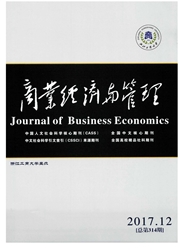

 中文摘要:
中文摘要:
文章认为,大型零售商在信息技术和组织创新的共同作用下,已经演化为双边市场中的平台型企业。通道费规制的水床效应表明:《零售商供应商公平交易管理办法》通过限制零售商的各种交易行为来抑制买方势力,对通道费问题的解决不会有实质性意义。文章将双边市场的分析框架引入通道费问题的研究,由此发现通道费是零售商平衡双边用户需求、内部化用户间网络外部性的市场规则,其制定和协调是通过零售商之间的渠道竞争而实现的。
 英文摘要:
英文摘要:
This paper believes that large retailers have evolved into the platform-based firms in two-sided markets through the interaction of information technology and organization innovation. The waterbed effects indicate that the policy on retailing industry implemented in 2006 to regulate buyer power is inefficient to reduce slotting allowances. This paper introduces an analysis framework of two-sided markets, and finds that slotting allowances are a market rule to balance demands and internalize network externalities across groups, which is established through the competition between retailers.
 同期刊论文项目
同期刊论文项目
 同项目期刊论文
同项目期刊论文
 期刊信息
期刊信息
